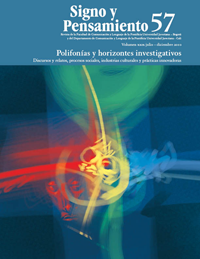Abstract
The proposal of this paper is to make a philosophical reflection about the cognitive configurations that occur during the experience of the so-called 'alternative reality games' (arg by its acronym in English), based on the phenomenological studies of semiotics by Charles Peirce. The main objective is to delimit, according to categories of thought, the process that occurs in the stages of this type of game, seeking to understand how that immateriality of thought and knowledge is constructed in a universe that transits between realities and fictions and that is based on the collectivity.
— (2003), “Hume e Peirce acerca do Ceticismo Cartesiano”. In: Kriterion. Belo Horizonte, v. xliv, n. 108, pp. 244-252.
Atem, G. (2008), “O imaterial - Fundamentos filosóficos-semióticos da produção de subjetividades”, in: Anais do ix Fórum de Estudos lingüísticos. Rio de Janeiro, Dialogarts-uerj.
Bolter, J. e Grusin, R. (1998), Remediation: Understanding new media. Cambridge (Estados Unidos), mit Press.
Castells, M. (2001), A Galáxia da Internet – Reflexões sobre a internet, os negócios e a sociedade. Rio de Janeiro, Jorge Zahar.
Deleuze, G. (2001), Empirismo e subjetividade. São Paulo, Editora 34.
Descartes, R. (1999), Discurso sobre o método. Rio de Janeiro, Nova Cultural.
Hume, D. (2001), Um tratado da Natureza Humana. São Paulo: UNESP.
—, Resumo do Tratado da Natureza Humana. Porto Alegre: Paraula.
Johnson, S. (2001), Cultura da interface. Como o computador transforma nossa maneira de criar e comunicar. Rio de Janeiro, Jorge Zahar.
Kant, I. (1999), Crítica da razão pura. São Paulo, Nova Cultural.
Levy, P. (1999), A inteligência coletiva: por uma antropologia do ciberespaço. São Paulo, Loyola.
— (2002), Cyberdémocratie. Paris, Odile Jacob.
Locke, J. (1978), Ensaio acerca do entendimento humano. São Paulo, Abril Cultural.
Mafessoli, M. (2006), O tempo das tribos: o declínio do individualismo nas sociedades pós-modernas. Rio de Janeiro, Forense Universitária.
McLuhan, M. (1969) Os meios de comunicação como extensão do homem (Understanding media), São Paulo, Cultrix.
Murray, J. (2003), Hamlet no Holodeck. O futuro da narrativa no ciberespaço. São Paulo, Itaú cultural - UNESP.
Nöth, W. (2003), Panorama da Semiótica – de Platão a Pierce. São Paulo, Annablume.
Peirce, C. (1982), Semiótica. São Paulo, Perspectiva.
— (1994), The collected papers of Charles Sanders Peirce. Cambridge, Massachussets, Harvard University Press.
Pimenta, F. (2005), “Produções multicódigos e o conceito de signo genuíno em Peirce”, in: Comum. Rio de Janeiro, Facha.
Platão (1996), Diálogos i: Mênon, Banquete. Fedro. Platão. Rio de Janeiro, Ediouro.
Queiroz, J. (2007), “Classificações de signos de C.S.Peirce – de On the Logic of Science ao Syllabus of Certain Topics of Logic”, in: Trans/Form/Ação, vol. 30, núm. 2, pp. 179-195.
Santaella, L. (2001), Matrizes da linguagem: sonora, visual, verbal. São Paulo, Iluminuras-FAPESP.
— (1995), A Teoria Geral dos Signos – Semiose e Autogeração. São Paulo, Ática.
This journal is registered under a Creative Commons Attribution 4.0 International Public License. Thus, this work may be reproduced, distributed, and publicly shared in digital format, as long as the names of the authors and Pontificia Universidad Javeriana are acknowledged. Others are allowed to quote, adapt, transform, auto-archive, republish, and create based on this material, for any purpose (even commercial ones), provided the authorship is duly acknowledged, a link to the original work is provided, and it is specified if changes have been made. Pontificia Universidad Javeriana does not hold the rights of published works and the authors are solely responsible for the contents of their works; they keep the moral, intellectual, privacy, and publicity rights.
Approving the intervention of the work (review, copy-editing, translation, layout) and the following outreach, are granted through an use license and not through an assignment of rights. This means the journal and Pontificia Universidad Javeriana cannot be held responsible for any ethical malpractice by the authors. As a consequence of the protection granted by the use license, the journal is not required to publish recantations or modify information already published, unless the errata stems from the editorial management process. Publishing contents in this journal does not generate royalties for contributors.


